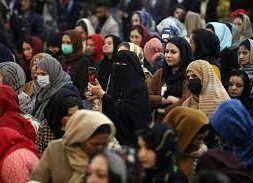
Horrifying Tales of Afghan Women under Taliban
Manas Dasgupta
NEW DELHI, Aug 14: The days of the Afghan girls and women going back under the “purdah” seems to be imminent with the Taliban slowly gaining control of most of the regions in war-torn Afghanistan.
According to the repots coming across the border, the Taliban are issuing horrifying diktats to girls and women in areas which are now under their control. The United Nations has expressed shock over these curbs.
As the women in Afghanistan, especially those who grew up in a Taliban-free country, fear of their future under the Taliban dominance, families that have taken refuge in Kabul bear testimony to the regressive diktat the insurgent group has already started issuing.
Media reports said a schoolteacher from Takhar province in northern Afghanistan said after Taliban capture women were not allowed to go out to the market without a male escort.
Girls riding home in a motorised rickshaw in the Takhar province were stopped and lashed for wearing “revealing sandals”, the report said quoting families who have left their homeland and now took refuge in Kabul — on the sidewalk, in the park.
Those who saw Taliban rule before 2001, for them these diktats bring a flashback of that harrowing time when women were not allowed to study and work. The Taliban also carried out public executions, chopped off the hands of thieves and stoned women accused of adultery.
The Taliban now control more than two-thirds of the country, including Herat and Kandahar, the two of the largest cities of the country. According to reports, it is now just a matter of time that Kabul will also be captured by the Taliban, though Afghan president Ashraf Ghani promised to remobilize his armed forces to continue to fight.
United Nations Secretary-General Antonio Guterres on Friday said horrific reports of Taliban oppression on Afghan women and girls have emerged from areas that have already been seized. “I’m… deeply disturbed by early indications that the Taliban are imposing severe restrictions on human rights in the areas under their control, particularly targeting women and journalists,” Guterres told reporters.
Some women who have been working from home but after the Taliban took over Herat, they were not being able to work, are apprehensive that those who loved music would not be able to play their musical instruments, the boys would not be able to play football, and the women community of the country who had even reached the parliament in the last 20 years, would again be pushed back to the wall behind the iron curtain.
Zarmina Kakar, a women’s rights activist in Kabul, was a year old when the Taliban entered Kabul for the first time in 1996. Her mother took her out to buy her ice cream and was whipped by a Taliban fighter for revealing her face for a couple of minutes. “Today again, I feel that if Taliban come to power, we will return back to the same dark days,” she said.














